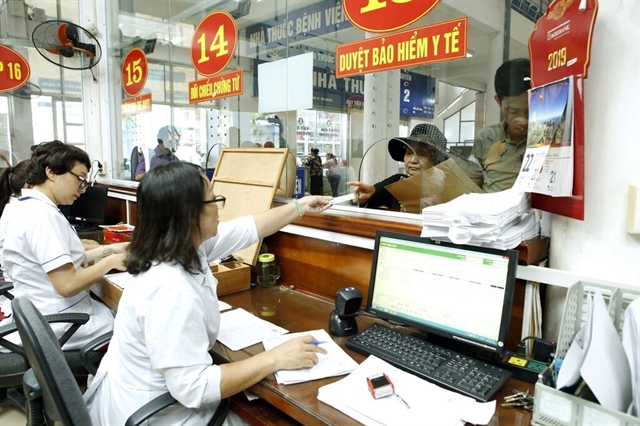 Society
Society

 |
| Health insurance officers handle medical payments at Thái Nguyên Central General Hospital. — VNA/VNS File Photo Dương Ngọc |
HCM CITY — The amended Law on Health Insurance came into effect on Tuesday, bringing changes that medical experts say reflect a strong commitment to equitable, practical and sustainable universal healthcare.
After her mother was recently diagnosed with liver cancer, Hoàng Minh Thu from Đồng Nai Province, planned to obtain a treatment referral from their local hospital, where her mother had registered for initial health insurance services.
This paper is a requirement if Thu wants to bring her mother to HCM City Oncology Hospital for specialised treatment.
Thu was relieved to hear the news that with the new health insurance law coming into effect on July 1, patients with severe illnesses like her mother’s could go directly to specialised hospitals without referral and still receive full insurance coverage.
“My mother is currently staying at my house in HCM City," Thu said.
"When we heard this news, the whole family felt a huge relief because it means one less cumbersome administrative step, saving us time, travel and expenses.”
Dr Diệp Bảo Tuấn, director of HCM City Oncology Hospital, agrees that this update is a key highlight in the amended health insurance law.
In the past, patients screened at the oncology hospital and found to have cancer had to return to their registered health service provider to obtain a referral. Now, they can be admitted directly to the hospital while receiving 100 per cent insurance coverage.
“This is a humane and practical reform that saves time, reduces costs, and most importantly, ensures that patients don’t miss their critical treatment window,” said Tuấn.
In addition, the amended law also removes administrative boundary restrictions for health insurance services.
Previously, individuals temporarily residing outside their registered locality had to return home to make use of their health insurance.
With the new law, those who declare temporary residence of 30 days or more can receive insurance-covered treatment where they are staying.
Welcoming these changes, Tăng Chí Thượng, director of HCM City’s Department of Health, said that the updates align with the current internal migration flows for work and study, especially in a dynamic city like HCM City.
This facilitates timely access to healthcare and ensures people’s rights, he said.
Inclusive benefits
For the first time, the revised law allows health insurance to cover home visits and telemedicine services, including medication, medical supplies and reasonable transport costs in emergency transfers or hospitalisations.
Health experts see this as an especially meaningful advance for the elderly, chronically ill, people with disabilities, and residents of remote areas.
Meanwhile, individuals who have maintained uninterrupted insurance coverage for five consecutive years will have all medical costs covered (within the insurance package) if their co-pay in a given year exceeds six times the base reference amount (VNĐ14.04 million or US$540).
This incentive both rewards long-term participants and encourages continued, responsible engagement with the health insurance system.
The new law also provides more support to disadvantaged groups such as village health workers, part-time community officials, recognised artisans, and human trafficking survivors.
Many others will receive fully subsidised insurance cards, including militia members, near-poor individuals aged 70-75 receiving monthly survivor benefits, social pensioners, and those who have reached retirement age but are not yet eligible for a pension.
“Health insurance is not just a financial tool, it is a long-term welfare safety net for every citizen,” said HCM City’s health department director Thượng.
Training for health care professionals on these new policy updates is a key factor in ensuring effective implementation and maximising benefits for health insurance participants, according to Tiền Kiến Lượng, deputy head of the health insurance benefits division overseeing HCM City.
Training content should focus on the new provisions of the law, particularly those related to healthcare benefits and payment methods. At the same time, medical facilities must update their software systems to comply with new regulations on treatment referrals and the removal of administrative boundary restrictions, he said.
They should also develop and put in place clear procedures for insurance payments in medical examination and treatment, he added.
Lượng also noted that the number of patients seeking care at primary-level health facilities is expected to increase with referral benefits. Therefore, hospitals need to review and arrange their workforce, medications, medical supplies and equipment to ensure they can adequately meet public healthcare demands. — VNS




